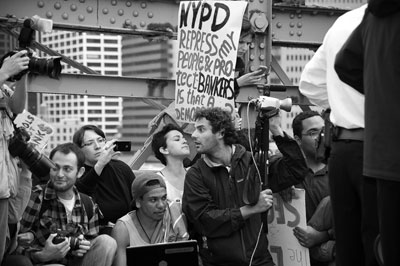Over 30 years of anarchist writing from Ireland listed under hundreds of topics
Revolution
Perspectives for Struggle and Revolution
What this Paper is
What we summarise below is what the WSM has collectively agreed are the prospects for struggle in the short and medium term both in terms of global and local capitalism but more importantly of the existing movements and struggles and those we think are coming into existence. It should be read in conjunction with ‘The Role of the Anarchist Organisation’ which is the long term strategic view within which these short and medium terms considerations are shaped. Fundamentally we think ‘kick it till it breaks’ leads to burnout and inactivity. Sustained organising over decades requires a collective understanding and identification of the moments of opportunity scattered through the periods of preparation and experimentation.
Perspectives for Struggle and Revolution
A Workers Solidarity Movement Position Paper
Rojava - Revolution Between a Rock and a Hard Place
 Revolutions are seldom made in favourable circumstances. Russia 1917 emerged from the mass slaughter of WWI and the disintegration of an economy under the pressure of the supply demands of that war. Spain 1936 emerged from a well planned and executed fascist coup amongst a powerful military backed and armed by international fascism. Schemas for revolution that depend on quiet times and plenty may well be doomed from the start.
Revolutions are seldom made in favourable circumstances. Russia 1917 emerged from the mass slaughter of WWI and the disintegration of an economy under the pressure of the supply demands of that war. Spain 1936 emerged from a well planned and executed fascist coup amongst a powerful military backed and armed by international fascism. Schemas for revolution that depend on quiet times and plenty may well be doomed from the start.
That said it’s hard to imagine more impossible conditions for revolution than that of Rojava. A brutal civil war, 3 small areas of territory that were kept in a state of low development by the previous regime and are not even linked to each other. A fanatic army of barbaric religious extremists armed with captured looted US heavy weaponry attacking from one side, a hostile state quietly backing that army and closing its borders to the good guys on another and waiting in the wings the old regime and its long history of brutal counter insurgency. And above all this the tactical and strategic intervention of an imperialist power whose manipulations have devastated the land to the South East over a period of almost three decades.
Revolutionary Organization in the age of Networked Individualism
 The revolutions and revolts that swept the world in 2011 took almost everyone by surprise. One of the first strong attempts to explain why they happened is Paul Mason’s ‘Why It’s Kicking Off Everywhere.’ He argues that “the materialist explanation for 2011...is as much about individuals versus hierarchies as it is about rich against poor.” By far the most provocative element of his book is the idea that communications technology, in particular the internet, is transforming the way people behave and that a significant contribution to the revolts of 2011 lie in these changes. If he’s right it had profound consequences for the form and structure of revolutionary organisations including anarchist ones.
The revolutions and revolts that swept the world in 2011 took almost everyone by surprise. One of the first strong attempts to explain why they happened is Paul Mason’s ‘Why It’s Kicking Off Everywhere.’ He argues that “the materialist explanation for 2011...is as much about individuals versus hierarchies as it is about rich against poor.” By far the most provocative element of his book is the idea that communications technology, in particular the internet, is transforming the way people behave and that a significant contribution to the revolts of 2011 lie in these changes. If he’s right it had profound consequences for the form and structure of revolutionary organisations including anarchist ones.
This article also availale on audio & video, see end.
Anarchism, militarism and civil war - Can you have an anarchist army? - Looking at the Makhnovist Movement
AS ANARCHISTS believe the bosses will resist a revolution, it follows that we accept the need for armed force to defend the revolution. But anarchists also oppose militarism, that includes standing armies controlled by the state with officers who have special privileges like extra rations, better quarters, saluting, etc. So what alternative do anarchists propose? [Greek translation]
Which Way to the Revolution?
A complete transformation of society, revolution, is the goal of anarchism. Ray Cunningham looks at what is meant when anarchists talk about revolution, and what can be done to bring it closer.
From the 1870's the world has been rocked by revolutions, but all have gone down to defeat. Anarchists believe they understand why previous revolutions have failed, but do we know how a successful revolution can be made? Are there steps we can take today to prepare and nurture such a revolution, or is it a question of waiting for the ripening of time?
An introduction to the Russian Revolution from an anarchist perspective
The Russian revolution of 1917 has been a subject of key importance to anarchists for 70 years now, for two reasons. The first reason is that for the first time in history a working class revolution succeeded in ousting the old ruling classes. The second reason is that after the old ruling class was ousted a new class came to power. Those of us who want to make a revolution to-day must understand where the successes and failures of the past came from.
Revolution in Rojava - audio of Dublin launch and discussion by author
Revolution in Rojava” is an eye-witness account on the experience of creating a bottom up social order which actively challenges all forms of oppression and exploitation. The struggle in Rojava (a mostly Kurdish region north of Syria), despite the extent of counterrevolutionary and imperialist forces aligned against it, continues to nurture an autonomous, grassroots resistance across its multiply ethno-religious communities.
Kicking off the 2011 Revolts in the age of the Networked Individual
 To what extent do the revolutions and revolts of 2011 reflect a new world born from the shell of the old? Were these revolts of the internet generation -- networked individuals? Are people not only using new technology but becoming transformed by it? For anarchists, what lessons can we learn and to what extent must we transform our organisational methods and structures?
To what extent do the revolutions and revolts of 2011 reflect a new world born from the shell of the old? Were these revolts of the internet generation -- networked individuals? Are people not only using new technology but becoming transformed by it? For anarchists, what lessons can we learn and to what extent must we transform our organisational methods and structures?
Because of the length of this review
its been made available as a 15 page
PDF file to download and read off line.
An Egyptian anarchist on the renewed revolution in Egypt
 As revolution once more erupts in Egypt Yasser Abdullah from the Egyptian Libertarian Socialist Movement has explained what is going on in two interviews with Anarkismo.net. He outlines the origins of this latest phase of the revolution, of note is how a sit-in of just a few dozen a few days ago was the catalyist that has resulted in the mobilizations of hundreds of thousands. (Image: Lilian Wagdy)
As revolution once more erupts in Egypt Yasser Abdullah from the Egyptian Libertarian Socialist Movement has explained what is going on in two interviews with Anarkismo.net. He outlines the origins of this latest phase of the revolution, of note is how a sit-in of just a few dozen a few days ago was the catalyist that has resulted in the mobilizations of hundreds of thousands. (Image: Lilian Wagdy)
Yasser looks at the relationship between the Islamists including the Muslim Brotherhood and the military council (SCAF) and how those defending the square on the 20th were the "the main revolutionary forces and the unorganised youth" and not the brotherhood. On the 20th Yasser concludes by saying "the people now realize that their power lies in a leaderless, collective movement."
By the 22nd Sharraf’s government is offering to resign and Yasser is outlining what the demands of the people are and that the Egyptian anarchist communist movement is using the slogan "All power to the people" and "calling for civil disobedience all over Egypt and for a general strike by the Egyptian workers."
The Spanish Civil War - Rebellion and Resistance - Chapter 1
In the 1930's Europe was experiencing one of its' worst ever slumps. The Wall Street crash came in 1929 and its repercussions were felt far and wide. Spain was no exceptionBy 1936 unemployment had gone over 30% in many of the towns and cities Out of a total workforce of three million, one million were out of work. There was no dole and as prices rose by 80% in the five years up to 1936, many encountered severe hardship.

